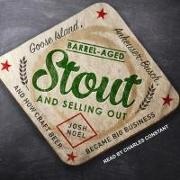Read more
Goose Island opened as a family-owned Chicago brewpub in the late 1980s, and it soon became one of the most inventive breweries in the world. In the golden age of light, bland, and cheap beers, John Hall and his son Greg brought European flavors to America. With distribution in two dozen states, two brewpubs and status as one of the twenty biggest breweries in the United States, Goose Island became an American success story and was a champion of craft beer. Then, on March 28, 2011, the Halls sold the brewery to Anheuser-Busch InBev, maker of Budweiser, the least craft-like beer imaginable. The sale forced the industry to reckon with craft beer's mainstream appeal and a popularity few envisioned. Josh Noel broke the news of the sale in the
Chicago Tribune, and he covered the resulting backlash from Chicagoans and beer fanatics across the country as the discussion escalated into an intellectual craft beer war. Anheuser-Busch has since bought four other craft breweries, and from among the outcry rises a question that Noel addresses through personal anecdotes from industry leaders: how should a brewery grow?
About the author
Josh Noel writes about beer and travel for the
Chicago Tribune, where he has worked since 2005. He has also contributed to the
New York Times and
This American Life, as well as other publications. He has become one of the nation's most recognizable beer journalists, writing about the subject as both a business and lifestyle story, and winning multiple awards from the North American Guild of Beer Writers, most recently consecutive first place honors for Best Local Reporting. He lives in Chicago with his wife and son.

